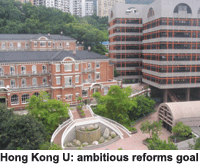Most universities regularly reassess the modules they offer, but the University of Hong Kong has gone beyond that to fundamentally re-imagine the undergraduate degree. It is a wholly more ambitious, and risky, project that significantly extends both the length and breadth of study. And it has the rest of the higher education world watching to see if such a bold plan can succeed.
 The transformation positions Hong Kong in the forefront of a wave of change that has been sweeping through universities across the world. Two years ago, the University of Melbourne shook up its curriculum, and the resulting ‘Melbourne model’ sparked a global debate about the type of degree needed to prepare young people for life and work in the 21st century. The University of Aberdeen has already detailed a new curriculum that offers undergraduates the opportunity to study a wider range of disciplines. As the Bologna Process and Lisbon Treaty march forward, other European universities are also making major changes to the way they educate their students.
The transformation positions Hong Kong in the forefront of a wave of change that has been sweeping through universities across the world. Two years ago, the University of Melbourne shook up its curriculum, and the resulting ‘Melbourne model’ sparked a global debate about the type of degree needed to prepare young people for life and work in the 21st century. The University of Aberdeen has already detailed a new curriculum that offers undergraduates the opportunity to study a wider range of disciplines. As the Bologna Process and Lisbon Treaty march forward, other European universities are also making major changes to the way they educate their students.
It is perhaps surprising that the University of Hong Kong is embarking on such wholesale reforms when it is already a member of the international elite with a reputation to maintain. At 24th position in the 2009 Times Higher Education-QS World University Rankings, it is Asia’s second-highest rated institution. As the Oxbridge of East Asia, its graduates are in demand — 80 percent go straight into employment after completing a first degree, and 18 percent take on further study. Such is its research standing that almost half the university’s 10,000 students are enroled in postgraduate programmes.
So why does it need to change? Given its location in a global business centre, the university is well placed to observe the ways in which the world its graduates will enter has been changed by globalisation. It is a very different one from that in which the university was established almost a century ago. Today’s graduates need to be able to operate in a multicultural, multilingual environment where they will have to acquire new skills to adapt to changing tasks and career paths.
But the university is populated predominantly (at least among the student community) by Hong Kong Chinese. Even at the postgraduate level, there are few international students — a visit to the campus suggests that Caucasian students are scarce, with black and South Asian faces rarer still. And a curriculum created for a different era requires updating to develop students’ intellectual flexibility and agility.
For Amy Tsui, Hong Kong’s pro vice chancellor (teaching and learning), globalisation has made the world smaller while the problems that society must deal with have become much larger in scale and more “ill-defined”. There are, she says, “fewer moral certainties, more moral dilemmas”, and a university education must address this.
Having grappled with all these issues while crafting its new curriculum, the university came to a radical solution. Hong Kong concluded that undergraduate learning is not only about academic endeavour, but the total experience of life on campus. Every part of a student’s life, from organising a party in halls to doing voluntary work for a charity, should contribute towards the university’s educational aims.
Because such an ambitious programme requires time, undergraduate degrees at Hong Kong will be lengthened from three to four years by 2012 — although even with the extra year it will be no small task to achieve every goal. To ensure that all the desired qualities are instilled in students, all undergraduates will be expected to engage in experiential learning (in essence, problem-solving skills and practical training), undertake international study or work, and study a common core curriculum in addition to their degree discipline. English will be not only the language of instruction, but also the lingua franca for all activities on campus. And the university intends to recruit more students from abroad to help foster international engagement and global awareness.
Of all the changes, it is Hong Kong’s common core curriculum that is earning the most scrutiny from other institutions. By 2012, when the new curriculum comes into force, all students will be expected to take six general education modules in their first two years. These modules will reflect and explore “common human experiences”. Students may select from a range of modules, but they must take at least one on each of the following topics: scientific and technological literacy, the humanities, China, and global issues. “No matter what community you’re in, you will need to demonstrate an understanding of these issues,” Tsui says.
(Excerpted and adapted from Times Higher Education)